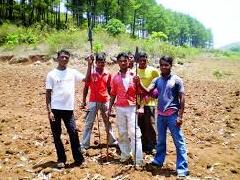Koraput: ‘Chaiti Parba’, the main festival of the tribals living in southern parts of Odisha, is in full bloom these days. While there is much to rejoice about the age old tradition of this month-long festival, the tribals — unaware of government rules — kill hundreds of animals, including endangered species every year during this period making this phase a traumatic one for conservationists.
Hunting animal is an integral part of this festival.
During its last 15 days, children and elderly members go deep into the jungle with various kinds of weapons such as spears, bows and arrows and do not return until and unless they — each of them — kill a prey. This tradition is famously known as ‘Bent Shikar’ in this area.
It, however, doesn’t go well with the conservation efforts and those who advocate it.
“In the name of keeping the tradition alive, tribals are killing hundreds of animals, destroying the ecosystem of a particular area,” rued a social activist in this district.
“Killing animals during this festival is not a new practice here. Year after year the hunt continues. Some argue that they are doing this out of their lack of awareness of government regulations such as Wildlife Protection Act. But, where is the administration? Is it not the duty of the administration to create awareness among the tribals to stop hunting,” asked a senior citizen.
Hunting apart, the methodology adopted by these men for hunting is equally damaging.
They begin by surrounding a patch of jungle and set it on fire. As animals — small and big — run for cover, they become easy prey for the hunters.
According to Wildlife Protection Act, 1972, killing endangered animals is an offence. So is setting the jungle on fire. While the government act has provisions of imprisonment and fine for such activities, tribals without any knowledge of such provision or awareness continue to hunt as they always did.
According to locals, during the ‘Chaiti Parba’ celebrations last year as many as 500 wild boars, 30 porcupines, 30 pangolins, 40 sambar deer, 200 barking deer and many other rare and endangered animals that are on the verge of distinction were hunted.
This year is no different either. Hunting continues as it always did.
Conservationists, however, point out that Koraput jungles will go devoid of some of these rare species, if hunting continues unabated.
In another sad addition to the already horrendous practice, government officials often visit these hamlets after the festival – not to sensitise them, but to buy some of the remaining body parts of the hunted animals like teeth, nails and scales among others. This, many a times, boosts the confidence of the tribals.
“They are hunting animals as they consider it as a part of their tradition. But it is a punishable offence. We are taking steps to make them aware of the rule and importance of animals in the ecosystem. At the same time, fire is immediately put out as and when it occurs. All steps are being taken to protect animals,” said Jeypore DFO Aswini Kumar Kar.
The ground reality, however, shows something else through and through. As the oblivious tribals sail close to the wind, the DFO’s assurance is a bitter pill to swallow for conservation efforts.
PNN
